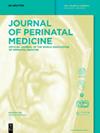了解英格兰产前丙肝检测和产科服务的现状
IF 1.4
4区 医学
Q3 OBSTETRICS & GYNECOLOGY
引用次数: 0
摘要
目的 目前尚未建议进行普遍的选择性丙型肝炎病毒(HCV)产前筛查,建议产科服务机构提供基于风险的检测。我们旨在调查产前丙型肝炎病毒(HCV)检测和检测指南的遵守情况。方法 我们在 2020 年 11 月至 12 月期间向产科服务提供者分发了一份横断面调查表,内容包括检测政策、医护人员培训以及对发现 HCV 阳性产妇的管理。本报告提供了描述性数据。结果 共收回 75 份问卷,占英国产科服务提供者的 48%。87% 的医疗机构表示提供产前基于风险的 HCV 检测。用于确定孕妇接受检测的风险因素各不相同。不到 15% 的受访者认为曾无家可归、有监禁史或来自 HCV 感染率较高地区的妇女属于高危人群。结论 目前的产前 HCV 检测方法不够完善,妊娠期 HCV 感染很可能得不到诊断,尤其是在易感人群中。在没有普及产前筛查的情况下,有必要将基于风险的产前HCV检测和管理作为一项质量改进措施,并为产科制定HCV具体路径指南。本文章由计算机程序翻译,如有差异,请以英文原文为准。
Understanding current antenatal Hepatitis C testing and care in maternity services in England
Objectives Universal opt-out antenatal screening for Hepatitis C virus (HCV) is not currently recommened and it is recommended that maternity services offer risk-based testing. We aimed to investigate antenatal HCV testing and adherence to testing guidance. Methods A cross-sectional survey was circulated to maternity service providers between November–December 2020 which included testing policy, training for healthcare staff, and management of women found to be HCV positive. Descriptive data are presented. Results 75 questionnaires were returned, representing 48 % of English maternity service providers. 87 % of providers reported offering antenatal HCV risk-based testing. Risk factors used to identify pregnant women for testing varied. Less than 15 % of respondents considered women that were ever homeless or with history of incarceraton or from higher HCV prevalence areas as high risk. Conclusions Current antenatal HCV testing practices are inadequate and HCV infection likely goes undiagnosed in pregnancy, especially among vulnerable population groups. In the absence of universal antenatal screening, re-framing antenatal HCV risk-based testing and management as a quality improvement initiative and developing HCV specific pathway guidance for maternity units is required.
求助全文
通过发布文献求助,成功后即可免费获取论文全文。
去求助
来源期刊

Journal of Perinatal Medicine
医学-妇产科学
CiteScore
4.40
自引率
8.30%
发文量
183
审稿时长
4-8 weeks
期刊介绍:
The Journal of Perinatal Medicine (JPM) is a truly international forum covering the entire field of perinatal medicine. It is an essential news source for all those obstetricians, neonatologists, perinatologists and allied health professionals who wish to keep abreast of progress in perinatal and related research. Ahead-of-print publishing ensures fastest possible knowledge transfer. The Journal provides statements on themes of topical interest as well as information and different views on controversial topics. It also informs about the academic, organisational and political aims and objectives of the World Association of Perinatal Medicine.
 求助内容:
求助内容: 应助结果提醒方式:
应助结果提醒方式:


